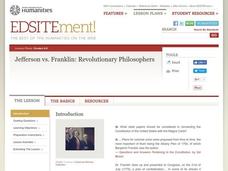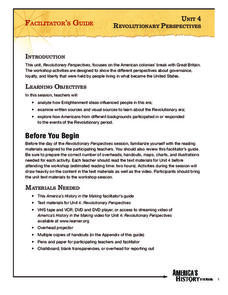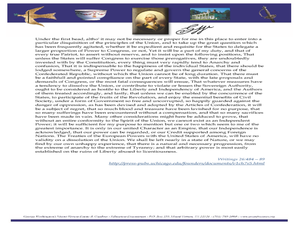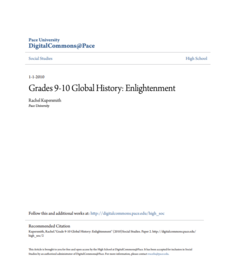Curated OER
Express Yourself Lesson Seed 13: Character Development 2
Building upon prior lessons in the series, this reading and writing exercise requires pupils to look back at their own writing, track character development in the novel The Cay, and analyze how Phillip has changed. The reading focus is...
Curated OER
Galileo and the Inevitability of Ideas
Learners research Galileo's work and contributions to science. They make a timeline of Galileo's life, discuss the historical context for his book "Dialogue on the Two Chief World Systems" and examine his trial by the Inquisition for...
Curated OER
Why Do Governments Exist? Locke, Hobbes, Montesquieu, and Rousseau
Here is a great secondary source reading that includes the primary ideas and philosophies of the famed Enlightenment philosophers: Thomas Hobbes, John Locke, Charles Montesquieu, and Jean-Jacques Rousseau. In additional to discussing...
Curated OER
Jefferson vs. Franklin: Revolutionary Philosophers
Middle schoolers cite connections among Franklin's Albany Plan of 1754, his Plan of Confederation of 1775 and the U.S. Constitution and/or the Declaration of Independence. In an essay, they give examples of the philosophical and...
Benjamin Franklin Tercentenary
What Ben Read
Just what did Ben Franklin read? By juxtaposing Ben Franklin’s reading material as a young man with an analysis of his developed ideas, learners gain the opportunity to see how the influences of his youthful reading played out. Roman,...
iCivics
Why Government?
Why do people create governments? Where did we get our ideas about government? This is a fantastic introductory instructional activity for your American government class that begins by reviewing the philosophies of Thomas Hobbes and John...
Annenberg Foundation
Revolutionary Perspectives
Life, liberty, and the pursuit of happiness. Learners go to the heart of the causes of the American Revolution. Examining political cartoons, Enlightenment documents, and firsthand accounts, they present their ideas and reflective...
Curated OER
Classical Greek Philosophy
Divided into three different slideshows, this presentation first introduces Socrates, Plato, and Aristotle. The second set of slides deepens the analysis of the philosophers and their ideas, and the third section compares each school of...
Reading Vine
Confucius: The Most Famous Teacher in China
Introduce young philosophers to the wisdom of China's most famous thinkers with a short bio. The reading comprehension passage includes an answer key.
K20 LEARN
Ancient Philosophy: Greeks or Romans?
While often not recognized, the ideas of ancient Greek and Roman philosophers still echo today. Using a series of videos and graphic organizers, individuals explore how ancient Greeks and Romans have influenced current Western political...
Curated OER
The Spread of Enlightenment Ideas
Looking for a simple and straightforward reference on the Enlightenment for your young historians? Check out this list of key terms and important figures from the period, followed by a traditional assessment where your learners will be...
Curated OER
Novel Ideas: History of the American Novel
Explore the history of the American novel in the contexts of literature and US history. How does a novel or piece of writing from a particular time showcase the mood during that historical period? After conducting research and discussing...
Curated OER
George Washington & the Classics
Students will compare and contrast famous philosophers with George Washington. In this history lesson, students work in small groups to define Classicism, Legalism, Democracy, Republic and Civility, then read some short excerpts so that...
University of North Carolina
Philosophy
Philosophers ask some of life's biggest questions about the nature of mankind, existence, and time, so what's it like to study the subject? A handout outlines different types of philosophy assignments common in college-level courses. The...
Pace University
Global History: Enlightenment
The core ideas of the Enlightenment—reason, knowledge, and freedom—represented a rebellion against the despotic control of absolute monarchs. As part of the study of the movement, class members assume the voice or either a monarch or an...
Blake Education
Harry Potter and the Philosopher’s Stone
The motto for Hogwarts School of Witchcraft and Wizardry warns that one should never tickle a sleeping dragon, but learners will definitely be tickled by the activities in a packet of materials designed to accompany a reading of the...
Houghton Mifflin Harcourt
Renaissance and Reformation Writing for the SAT
Responding to a question on the Machiavellian principle of a ruler's need for power and ruthlessness, young historians are given writing tips and a framework for constructing a well-developed essay in 25 minutes. The given structure of...
National Endowment for the Humanities
"An Expression of the American Mind": Understanding the Declaration of Independence
Students research the structure of the Declaration: introduction, main political/philosophical ideas, grievances and assertion of sovereignty. They analyze the ideological/political origins of the ideas in the Declaration. Students...
Houghton Mifflin Harcourt
Renaissance and Reformation Chapter Review
Review key terms, vocabulary, sequence of events, and themes from the Renaissance and Reformation with this textbook chapter review. While designed by a publisher for a particular text, this resource can be incorporated into any...
Curated OER
Rosencrantz and Guildenstern Are Dead: Concept Analysis
Make sure you are well-informed before embarking on a study of Rosencrantz and Guildenstern Are Dead. This resource includes an analysis of the text that a teacher can use to prepare a unit of study. It covers plot elements, themes,...
Curated OER
The Right Ideas
Students investigate the Bill of Rights and explain how non-profit organizations take care of those rights. In this Bill of Rights lesson, students work in groups to look at the rights that are included in the Bill of Rights. They...
Curated OER
Ideas of John Locke
In this life, liberty, and property worksheet, students read about the influences of John Locke and then write a short story on the back of the page. Students write about how life, liberty, and property have influenced them and their...
One Pot Learning
Reading Comprehension Worksheet
Three annotated passages from Ralph Waldo Emerson's essay on "Nature" provide young philosophers a chance to improve their reading comprehension skills as they gain insight into Emerson's ideas.
Pearson
Lesson Plan: Introduction to Plato’s Cave
Can we perceive reality or are we chained by preconceptions that limit our vision? Plato’s allegory “The Cave” serves to introduce nascent philosophers to Plato’s dialogues and hopefully to engender a love of ideas and discourse. A...

























